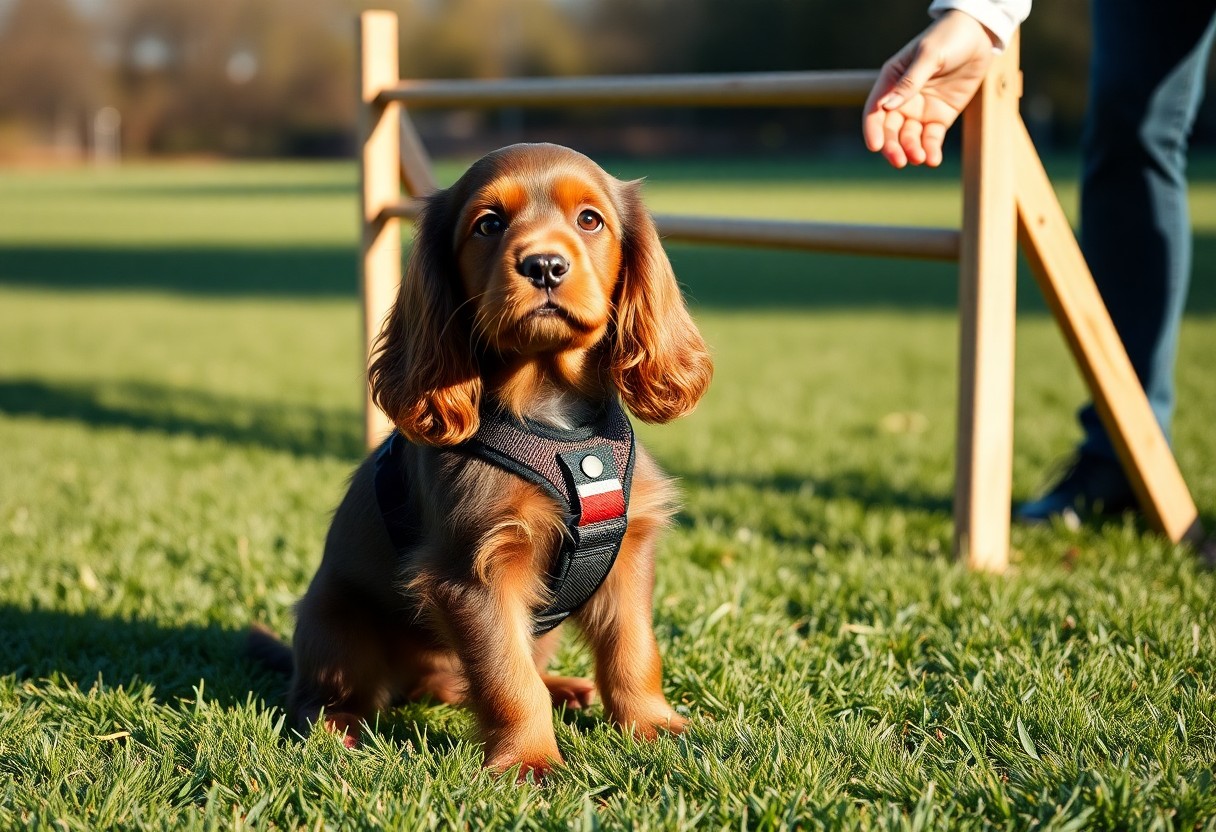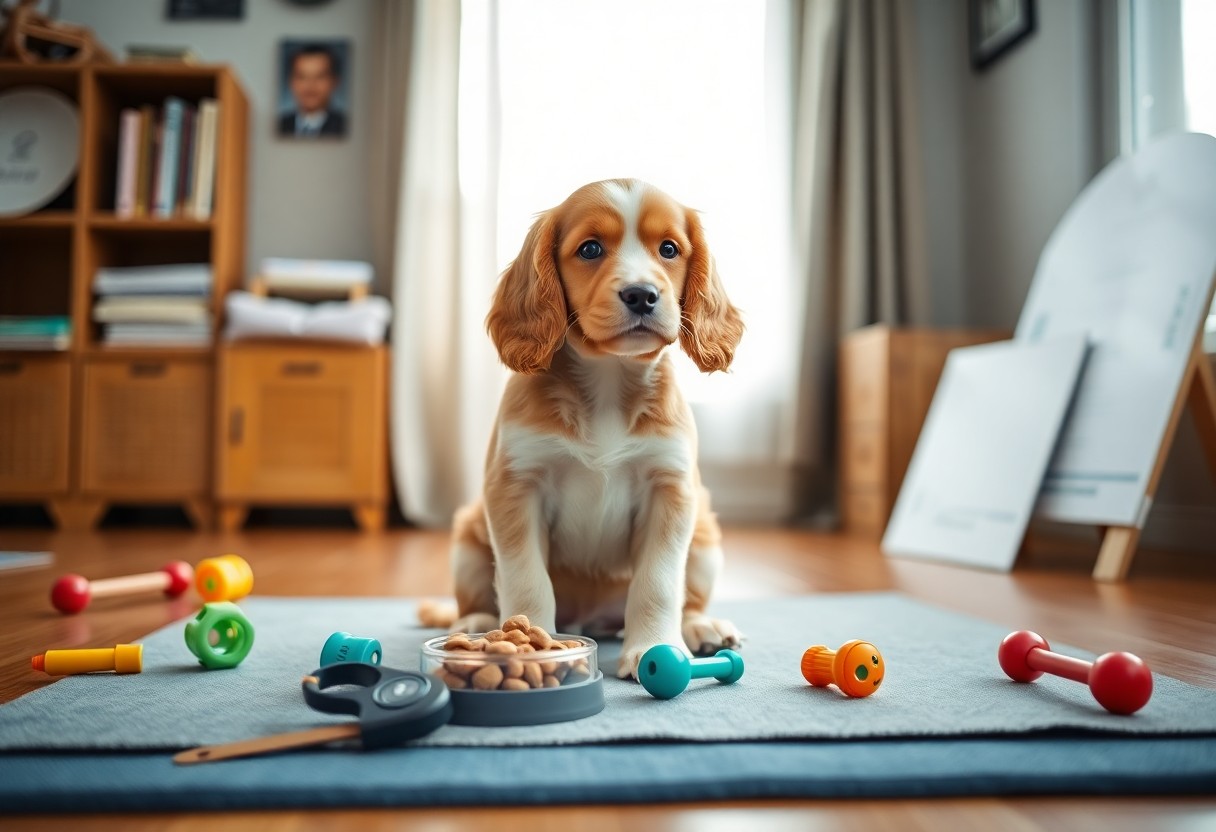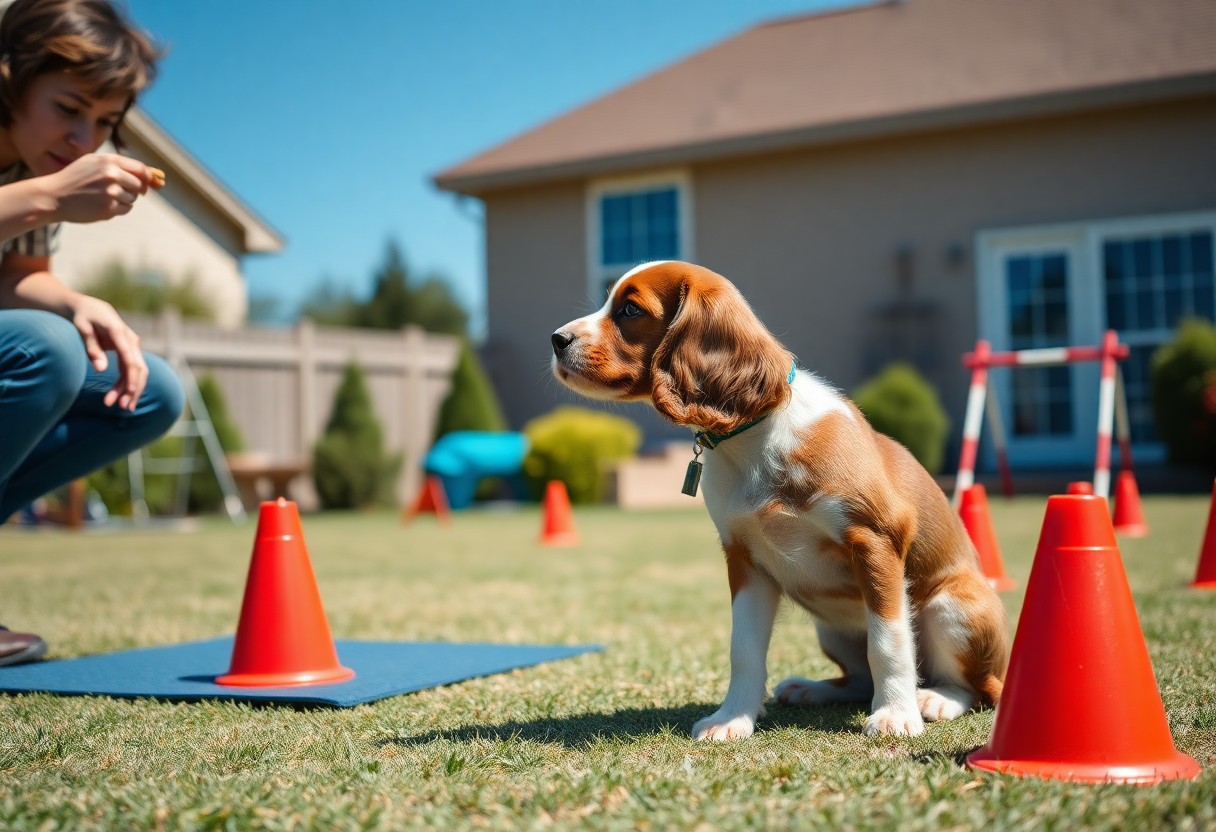Most new owners find that training your Cocker Spaniel puppy is both rewarding and challenging. By starting early, you can instill positive behaviors while steering clear of common pitfalls. Consistency, patience, and positive reinforcement are vital tools in your training toolkit. Your puppy’s enthusiastic nature makes them eager to learn, so you’ll want to harness that energy for effective results. With a solid understanding of their needs and behavior, you will build a strong bond that lasts a lifetime.
Key Takeaways:
- Begin training early to establish good habits.
- Utilize positive reinforcement techniques for effective learning.
- Be consistent with commands and expectations.
- Socialize your puppy with various environments and people.
- Incorporate short, fun training sessions to hold their attention.
- Address unwanted behaviors promptly to prevent them from becoming habits.
- Stay patient and flexible; learning takes time for both you and your puppy.
Understanding the Cocker Spaniel Breed
History and Characteristics
The Cocker Spaniel, originally bred as a hunting companion, showcased its skills in flushing game birds, particularly the woodcock. This breed has roots that date back to the 14th century, with early examples recognized for their agility and keen sense of smell. Cocker Spaniels are known for their medium size, with a silky, often wavy coat that comes in various colors. Their expressive eyes and long ears contribute to their charming appearance, while their friendly disposition makes them a beloved family pet.
Temperament and Behavior
Cocker Spaniels are known for their affectionate and playful nature, making them excellent companions for families and individuals alike. They thrive on human interaction and are highly social animals, which can lead to separation anxiety if left alone for long periods. Early socialization is important to curb tendencies toward shyness or excessive barking, and they often exhibit a willingness to please, responding well to positive reinforcement methods.
This breed’s loving temperament often shines through in their interactions. Cocker Spaniels are typically gentle with children, enjoying playtime and cuddles, which makes them an ideal family dog. However, they can be quite energetic; regular exercise is necessary to keep them happy and healthy. Instilling good behavior through training is vital, as these dogs can be easily distracted due to their curious nature. By engaging them early in social situations and consistent training, you can foster a confident and well-adjusted companion.
Preparing Your Home for a Cocker Spaniel Puppy
Before welcoming your Cocker Spaniel puppy, ensure your home is a suitable haven for their playful nature and inquisitive spirit. This involves decluttering and securing areas where your puppy will roam. Identify spaces for play, rest, and potty training. Consider both indoor and outdoor environments to make your new companion feel comfortable and safe from the start.
Essential Supplies
Gathering the right supplies is crucial for a smooth transition. Invest in high-quality dog food, food and water bowls, chew toys, a comfy bed, and grooming tools. Additionally, consider a sturdy leash, collar, and identification tags. These items promote healthy habits and provide the basic necessities your puppy needs.
Creating a Safe Environment
Establishing a safe environment for your Cocker Spaniel puppy involves removing hazards that could lead to accidents or injuries. Secure electrical cords, remove toxic plants, and keep small objects out of reach. Use baby gates to limit access to stairs or specific rooms until your puppy is fully trained. Providing a designated spot for them to explore ensures they feel secure, while also minimizing the risk of dangerous encounters.
When setting up your home, consider using training pads for potty training, which can help minimize accidents during the initial adjustment period. Designate a specific area for your puppy’s food and water, keeping it away from foot traffic for safety. Store cleaning supplies and medications in cabinets to avoid any accidents. Puppying-proof your living space means creating a cozy haven that promotes exploration while offering protection from potential dangers.
Basic Training Techniques
Implementing basic training techniques lays the foundation for a well-behaved Cocker Spaniel. Start with positive reinforcement, rewarding your puppy with treats or praise every time they exhibit the desired behavior. Use short, engaging training sessions, ideally lasting around 5 to 10 minutes, to keep your puppy’s attention while gradually introducing more complex commands.
The Importance of Consistency
Consistency in training aids your Cocker Spaniel in understanding expectations and commands. Use the same cues and signals for each action, whether verbal or physical. If you reinforce ‘sit’ with a hand gesture and vary it with another gesture in different sessions, confusion arises, making it harder for your puppy to learn.
Effective Commands to Teach
Introduce important commands that enhance communication between you and your Cocker Spaniel. Start with basic commands such as ‘sit’, ‘stay’, ‘come’, and ‘down’. These forms of communication are vital for managing your puppy’s behavior in various situations, ensuring safety and a harmonious household.
For effective command training, break down each command into simple steps. For instance, when teaching ‘sit’, hold a treat above your puppy’s nose and slowly move it back toward their tail. As their bottom touches the ground, say ‘sit’ and reward immediately. Practicing commands in different environments helps your dog generalize their understanding. Encourage repetition to reinforce learning, aiming to practice daily for the best results.
Socialization Strategies
Implementing effective socialization strategies is key to helping your Cocker Spaniel puppy grow into a well-adjusted adult dog. Exposure to different environments, sounds, and experiences during the first few months of life can significantly influence their temperament. Aim for a variety of encounters that prioritize positive interactions, ensuring your puppy is both comfortable and happy as they explore the world around them.
Early Socialization Experiences
Start socializing your Cocker Spaniel puppy at an early age, ideally between 3 to 14 weeks. This critical window allows for optimal exposure to new sights, sounds, and experiences. Puppy classes and safe outdoor outings provide valuable opportunities for them to meet new people and different environments, fostering confidence and adaptability.
Interactions with Other Pets and People
Facilitating positive interactions with other pets and people is vital for your puppy’s social development. Organize playdates with well-behaved dogs to help your Cocker Spaniel learn appropriate play styles and body language. Introduce your puppy to various people, including children and seniors, ensuring these interactions are calm and friendly to build trust and reduce anxiety.
Encouraging your Cocker Spaniel to engage with both pets and people builds their social confidence and reduces fearfulness around unfamiliar beings. Schedule regular play dates or visits to dog parks, where controlled interactions can take place. Always supervise these encounters to ensure safety, and use treats to reward positive behavior. A well-socialized puppy is likely to grow into a friendly, confident dog, less prone to behavioral issues in the future.
Health and Nutrition Guidelines
Establishing proper health and nutrition guidelines is vital for your Cocker Spaniel puppy’s development. Ensure you provide a balanced diet tailored to their age, weight, and energy levels. For insights on what are some tips and tricks for training and caring for your puppy, consider joining support groups and learning from experienced owners.
Choosing the Right Puppy Food
Selecting high-quality puppy food designed for small to medium breeds is necessary. Look for options that list protein sources as the first ingredient and are rich in omega fatty acids for a healthy coat. Avoid foods with excessive fillers, artificial additives, or by-products, which can lead to allergies or digestion issues.
Regular Veterinary Care
Regular veterinary visits help monitor your Cocker Spaniel puppy’s health, allowing for early detection of potential issues. Schedule vaccinations, check-ups, and dental care to ensure their growth aligns with breed standards.
During these visits, your veterinarian will not only administer vaccinations but also assess your puppy’s weight, diet, and overall health. You can discuss any behavioral changes or health concerns, ensuring that any issues are handled promptly. Regular examinations can also prevent minor issues from becoming serious, which is key to your puppy’s long-term well-being.
Exercise and Mental Stimulation
Consistent exercise and mental engagement are vital components of your Cocker Spaniel puppy’s overall well-being. These dogs are naturally energetic and require daily activity to prevent behavioral issues stemming from boredom. Aim for at least 60 minutes of physical exercise each day, which can include walks, playtime, or structured games that keep them moving and engaged.
Daily Exercise Requirements
Each day, your Cocker Spaniel needs a minimum of 60 minutes of exercise, split into multiple sessions to keep energy levels balanced. Activities like brisk walks, fetch, or running in a secure area will help build stamina and promote healthy weight management.
Engaging Toys and Activities
To stimulate your Cocker Spaniel mentally, incorporate a variety of interactive toys and challenging games into their routine. Puzzle toys that dispense treats or items that require problem-solving can keep your puppy entertained while promoting cognitive development.
Selecting the right engaging toys is key to keeping your puppy mentally stimulated. KONG toys filled with peanut butter or treats not only occupy their time but also encourage natural chewing instincts. Additionally, consider toys that squeak or make noise to heighten their curiosity. Incorporating training sessions with commands like ‘sit,’ ‘stay,’ or ‘roll over’ can further enrich their learning experience while strengthening your bond. Rotate toys regularly to maintain interest and incorporate outdoor activities like agility training to provide variety and challenge for your active Cocker Spaniel.
Summing up
Drawing together the necessary tips for training your Cocker Spaniel puppy, you can foster a well-behaved and happy companion. By establishing a routine, using positive reinforcement, and being patient, you create a strong bond with your puppy while ensuring effective learning. Consistency in commands, socialization with other dogs, and regular exercise will help your Cocker Spaniel thrive. Implement these strategies, and you will not only enhance your puppy’s training experience but also enjoy the delightful journey of companionship as they grow.
FAQ
Q: How often should I train my Cocker Spaniel puppy?
A: It’s best to train your Cocker Spaniel puppy several times a day for short periods, around 5 to 10 minutes each session.
Q: What commands should I start with?
A: Begin with imperative commands like sit, stay, come, and down to establish a solid foundation.
Q: How can I keep my Cocker Spaniel engaged during training?
A: Use treats, praise, and playtime as rewards to maintain your puppy’s interest and excitement.
Q: Is socialization important for my puppy?
A: Yes, exposing your Cocker Spaniel to various people, pets, and environments during early development helps build confidence and adaptability.
Q: What should I do if my puppy is not responding to training?
A: Reassess your training methods, use positive reinforcement, and ensure you’re being patient and consistent.
Q: How can I address unwanted behaviors in my puppy?
A: Redirect your puppy’s focus to positive behaviors and use commands to guide them away from undesired actions.
Q: When should I seek professional training help?
A: If you’re struggling with behavioral issues or feel overwhelmed, consulting a professional trainer can provide valuable guidance.


